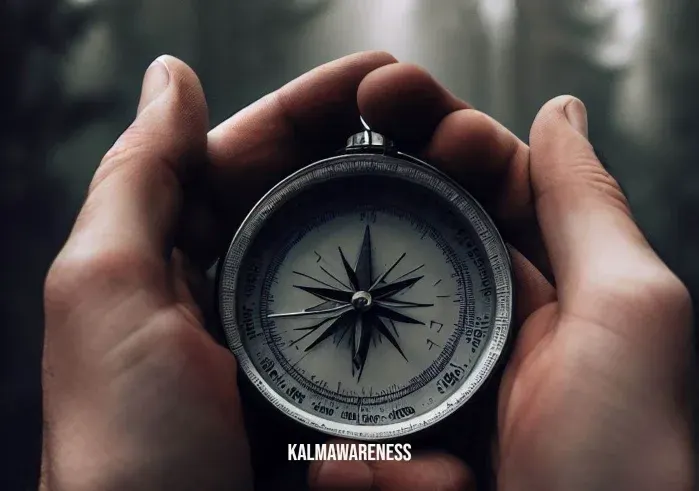Understanding Your Inner Compass: Navigating Life’s Complex Journey
Do you ever feel as if you’re aimlessly wandering through life, unsure of your direction? There’s a concept that might resonate with you in such times: your inner compass. By understanding the inner compass meaning, we can tap into a profound source of guidance, intuition, and inner wisdom. In this article, we’ll delve into the depths of this remarkable concept and its vital role in personal growth and mindfulness.
What is an Inner Compass?
Your inner compass is your innate guidance system. It’s the inner voice or intuition that guides you toward the right path, prompting you when something feels off or warning you about potential pitfalls. Rooted in self-awareness and mindfulness, your inner compass is more than just a metaphor; it’s an active component of your spiritual psyche, a manifestation of your higher self.
“The inner compass is not something you can see or touch—it’s a sense of knowing, a feeling that directs you towards your highest good.” – Amber Wolfe
How Does It Work?
Like a physical compass, your inner compass operates based on unseen forces—only here, the forces are the energies and vibrations around and within us. When we’re channeling our higher self, we’re better able to perceive these subtle energies and use them to guide our thoughts, decisions, and actions.
Think of your journey through life as traversing a vast, complex terrain. You may encounter dense jungles of uncertainty, cliffs of difficulty, or serene valleys of joy. While external tools—like advice from others or societal expectations—can offer directions, they can’t navigate the unique topography of your personal experiences and inner world. That’s where the inner compass comes in, providing guidance tuned to your unique frequency.
Activating Your Inner Compass
Accessing your inner compass begins with mindfulness. By focusing our awareness inward, we can cultivate a deeper connection with our higher self. Practices such as angelic meditation and channeling archangel Gabriel can be incredibly powerful tools for strengthening this connection. They create a space for the quiet voice of our intuition to be heard above the clamor of external stimuli and ego-driven thoughts.
Next, we can activate our third eye, often associated with intuition, foresight, and spiritual insight. Techniques for activating the pineal gland, like certain sound frequencies, can stimulate this ‘mind’s eye’ and enhance our intuitive capabilities. Take the 852 Hz frequency, for example, associated with awakening intuition and returning to spiritual order.
The Language of the Inner Compass
Your inner compass communicates in a language that transcends words—it speaks through feelings, images, and synchronicities. To understand its messages, we need to be receptive and willing to interpret nonverbal cues. Keep an eye out for recurring patterns and themes in your life, as these could be messages from your higher self.
Understanding your inner compass is akin to learning a new language—it takes time and practice. But with patience and consistency, you can develop a fluent dialogue with your higher self, leading to more harmonious decisions that align with your authentic self.
This first part of our journey into understanding the inner compass has laid the foundation for the significance of our innate guidance system. In the next part of this article, we’ll be diving deeper, exploring the ways in which we can finely tune our inner compass and how it relates to angelic guidance. Discover how to navigate your life journey using the wisdom of the universe and your highest self.

The Benefits and Challenges of Following Your Inner Compass
Understanding the concept of your inner compass is only the first step in the journey. To truly benefit from this powerful tool, we must delve deeper into its practical applications and potential challenges. We will also explore unique strategies that can help us align with our inner compass, further integrating it into our everyday lives.
Benefits of Following Your Inner Compass
Your inner compass doesn’t just point you in the direction of your highest good—it offers a host of benefits that can dramatically improve your overall life experience.
- Authentic Living: When we follow our inner compass, we make choices that are aligned with our true selves. It helps us to remain true to our values and desires, promoting a life that genuinely reflects who we are.
- Reduced Stress and Anxiety: Constantly second-guessing ourselves or feeling lost can generate stress and anxiety. By trusting our inner compass, we can reduce this uncertainty, paving the way for mental and emotional well-being.
- Increased Confidence: Following our inner compass can boost our confidence as it confirms that we’re capable of making wise and harmonious decisions for ourselves.
- Deepened Connection: Engaging with our inner compass facilitates a deeper connection with our higher self and the universe at large. This enhanced relationship can provide a sense of peace and belonging.
- Greater Spiritual Growth: Following our inner compass fosters spiritual growth. It allows us to traverse through the spiritual landscape with more awareness and purpose, evolving our consciousness and facilitating greater personal development.
Potential Challenges
While the benefits of using your inner compass are substantial, we should also acknowledge the potential challenges. It’s important to understand that the path of authentic living isn’t always an easy one. Here are some potential hurdles you might encounter:
| Challenge | Description | Solution |
|---|---|---|
| Social Pressure | Society often encourages conformity. Your inner compass might guide you towards a path that defies social norms or expectations. | Stay firm in your decisions. Remember, your path is unique to you and doesn’t have to align with societal expectations. |
| Fear | Fear of the unknown or of making mistakes can prevent us from following our inner compass. | Practice trust in your higher self and the universe. Recognize that mistakes are opportunities for growth. |
| Ego Interference | The ego often resists change and prefers familiarity. It may resist the direction your inner compass is pointing towards. | Cultivate self-awareness to differentiate between ego-driven decisions and true inner guidance. |
| Misinterpretation | Misunderstanding the signs from your inner compass can lead you astray. | Engage in practices like meditation and spiritual insight to improve your understanding of your inner compass’s language. |
| Doubt | Doubting the legitimacy or reliability of your inner compass can hinder your progress. | Patience and consistency are key. The more you use your inner compass, the more confident you’ll become in its guidance. |
Strategies for Alignment
Now that we’ve covered the benefits and challenges, let’s delve into some strategies that can help us align with our inner compass.
- Meditation: Regular meditation helps quiet the mind and enhances our ability to hear the subtle guidance of our inner compass.
- Journaling: Journaling can be a powerful tool for capturing and interpreting the messages from our inner compass.
- Nature Immersion: Spending time in nature can help align us with the natural rhythms of the universe, fine-tuning our inner compass.
- Mindful Practices: Activities like yoga, tai chi, or mindful tarot can enhance our awareness and connection with our higher self.
- Affirmations: Positive affirmations reinforce our trust in our inner compass and strengthen our commitment to follow its guidance.
In this chapter, we’ve deepened our understanding of the inner compass, including its practical benefits, potential challenges, and alignment strategies. In the next part of this article, we’ll delve into real-world examples of how the inner compass operates, illustrating its role in various aspects of life, from decision-making to personal growth. We’ll also provide practical exercises to help you connect with your inner compass more effectively. Let’s continue our exploration into the profound inner compass meaning

How Your Inner Compass Operates in the Real World
In our ongoing exploration of the inner compass meaning, we have discussed the concept, benefits, challenges, and strategies to align with it. Now let’s bring this theory into reality, understanding how the inner compass operates in the practical, everyday world. We’ll also suggest some exercises to deepen your connection with your inner guidance.
Everyday Decisions and Your Inner Compass
One of the areas where your inner compass shines most brightly is in decision-making. From the smaller choices, like what to eat for lunch or which route to take to work, to more significant decisions like career changes or relationships, your inner compass can provide insightful guidance.
For instance, consider the process of choosing a career path. Social norms or familial expectations might push you towards a certain profession. Yet, if you check with your inner compass, it might point towards an entirely different career—one that might not be as socially esteemed or financially lucrative but fills you with joy and a sense of purpose. Following your inner compass in such scenarios means choosing authenticity and inner peace over societal approval.
Similarly, in relationships, your inner compass can guide you in understanding whether a relationship is serving your highest good or not. If you often feel drained or unhappy in a relationship, it’s a sign from your inner compass that something needs to change. By being in tune with your inner wisdom, you can make choices that contribute to healthier and happier relationships.
Inner Compass and Personal Growth
Besides decision-making, your inner compass is also instrumental in your personal growth journey. It nudges you towards experiences and lessons that foster your evolution.
Let’s say your inner compass guides you to enroll in a personal development workshop or read a specific book. Even though it may not make sense at the moment, following that nudge can lead to profound insights and growth that you wouldn’t have experienced otherwise.
Your inner compass might also draw your attention to limiting beliefs or patterns holding you back. These ‘nudges’ may come in the form of recurring thoughts, synchronicities, or even challenges. Paying attention to these signs can help you uncover and release what no longer serves you, making room for new growth.
Practical Exercises to Connect with Your Inner Compass
Now that we understand how the inner compass operates in the real world, let’s explore some practical exercises to help you connect more deeply with your inner compass.
- Body Wisdom Exercise: Your body often reflects the guidance of your inner compass. To tap into this wisdom, close your eyes and imagine a scenario or decision you’re contemplating. Notice any sensations in your body. Do you feel light and expanded or tight and contracted? Your body’s response can be a clue from your inner compass.
- Intuition Development Exercise: Regularly ask yourself intuitive questions like, “What does my inner compass suggest about this situation?” or “How can I align with my highest good today?” Journaling your answers can help improve your connection with your inner compass.
- Meditation Exercise: Regular meditation can help you silence the mind and hear the subtle whispers of your inner compass. Try setting an intention before meditating to receive guidance from your inner compass.
- Nature Connection Exercise: Spend time in nature and ask for guidance or clarity about a particular situation. Nature, with its innate wisdom, can serve as a mirror for your inner compass.
This chapter gave us an insight into how our inner compass guides us in everyday life and personal growth, along with some practical exercises to deepen our connection. In the next part of this exploration, we will discuss the science behind the inner compass. We’ll delve into topics like intuition, the subconscious mind, and synchronicities, tying them back to our understanding of the inner compass meaning. Let’s keep sailing through this voyage of inner discovery.

The Science Behind Your Inner Compass
In our exploration of the inner compass meaning, we’ve ventured into its conceptual understanding, practical implications, and strategies to connect with it. Now, we embark on a journey into the scientific aspect of our inner compass. How does science perceive this ethereal concept of inner guidance? Can the inner compass be explained with neurological or psychological principles? Let’s dive in and unravel these fascinating aspects.
Inner Compass and the Subconscious Mind
“The subconscious mind is like a compass, guiding us through life.” – Anonymous
Our subconscious mind plays a significant role in our inner compass’s functioning. Comprising nearly 95% of our mind, the subconscious is a reservoir of our past experiences, beliefs, and patterns. It holds a mirror to our deep-seated emotions and desires, often influencing our decisions and behaviors.
The inner compass, in many ways, is the voice of the subconscious mind. When we experience a ‘gut feeling’ or an intuitive nudge, it is our subconscious mind communicating through the language of emotion. The more we learn to interpret these emotional cues, the better we align with our inner compass.
The Role of Intuition in Inner Compass
“Intuition is the GPS of the soul.” – Albert Einstein
Another fascinating aspect of our inner compass is intuition. Science increasingly recognizes intuition as a valid form of knowledge, with numerous studies exploring its neural basis. It is believed that our intuition, or ‘sixth sense’, stems from the brain’s ability to process information on a subconscious level.
Intuition often communicates through a sense of ‘knowing’ that goes beyond logical reasoning. When we make decisions aligned with our intuition, we’re essentially following our inner compass. And as research suggests, intuitive decisions tend to be faster and more accurate than those solely based on analytical reasoning.
The Science of Synchronicities
“Synchronicity is an ever-present reality for those who have eyes to see.” – Carl Jung
Synchronicities, or meaningful coincidences, often serve as signposts from our inner compass. Swiss psychiatrist Carl Jung, who coined the term, viewed synchronicities as manifestations of the archetypal patterns or dynamics of the unconscious mind.
Consider, for instance, repeatedly seeing a specific number or symbol, or having a conversation that answers a question you’ve been pondering. These synchronicities are like whispers from your inner compass, guiding you towards your highest good.
The science of synchronicities is closely tied to the concept of quantum entanglement in physics, suggesting an interconnectedness among all things. Aligning with this interconnectedness helps us navigate life with the help of synchronicities.
This chapter explored the fascinating intersection of science and the inner compass meaning. We discussed the roles of the subconscious mind, intuition, and synchronicities, providing a scientific perspective to our inner compass.
In the final part of our exploration, we will look at how different spiritual traditions perceive the inner compass. We’ll delve into teachings from Buddhism, Hinduism, Taoism, and other traditions, enriching our understanding of this inner guide. Join us in this intriguing journey into the wisdom of the ages.

Ancient Wisdom on Your Inner Compass
Our journey into understanding the inner compass meaning has brought us to various realms – from conceptual definitions to practical applications, scientific explanations to synchronicities. Now, let us explore the ancient wisdom from various spiritual traditions that shed light on this inherent guiding system. As we uncover these teachings, let us be inspired by their profound insights and wisdom that guide us towards our true self.
Buddhism and the Inner Compass
“Do not seek to follow in the footsteps of the wise; seek what they sought.” – Buddha
Buddhism teaches mindfulness and awareness as key elements in our spiritual journey. It encourages us to look inward, observe our thoughts, feelings, and sensations without judgment, and navigate life’s path with wisdom and compassion.
Mindfulness in Buddhism serves as the guiding force or the inner compass to help us discern the right actions and attitudes, leading us towards enlightenment and liberation from suffering.
| Buddhism Principles | Relation to Inner Compass | Path to Follow |
|---|---|---|
| Mindfulness | Keeps us connected with the present moment | Live in the present |
| Compassion | Serves as a guiding force | Embrace love and kindness |
| Impermanence | Reminds us that everything changes | Embrace change |
| Non-attachment | Encourages detachment from desires | Let go of clinging |
| Enlightenment | The ultimate goal | Follow your inner guidance |
Taoism and the Inner Compass
“The truth is not always beautiful, nor beautiful words the truth.” – Lao Tzu
Taoism, an ancient Chinese philosophy, emphasizes living in harmony with the Tao (the Way), the natural order of the universe. It proposes that by aligning with the Tao, we align with our inner compass, leading to a life of balance and ease.
Hinduism and the Inner Compass
“You have within you right now, everything you need to deal with whatever the world can throw at you.” – Bhagavad Gita
Hindu philosophy proposes the concept of Dharma – the moral and ethical duties and responsibilities that one must follow to live a righteous life. Dharma acts as the inner compass, guiding individuals towards actions that uphold societal harmony and personal growth.
This chapter has allowed us to delve into the profound wisdom from Buddhism, Taoism, and Hinduism about our inner compass. Each spiritual tradition, with its unique teachings, guides us towards our true nature and highest potential.
In the next part of our journey, we’ll explore the connection between our inner compass and personal growth. How can aligning with our inner compass lead to transformative personal growth? We’ll also delve into practical exercises and meditations to fine-tune and strengthen our inner compass. Let these timeless teachings inspire hope and confidence as we continue our exploration.

Personal Growth and Your Inner Compass
Understanding the inner compass meaning is like unveiling a treasure map leading us towards personal growth and self-actualization. As we journey through the different landscapes of self-discovery and growth, our inner compass becomes a reliable guide, illuminating our path with wisdom and insight. In this chapter, let’s explore how tapping into our inner compass can catalyze transformative personal growth.
Inner Compass: The Gateway to Self-Actualization
Self-actualization, a term coined by psychologist Abraham Maslow, refers to the process of realizing and fulfilling one’s potential and capabilities. It is the pinnacle of personal growth, a state where we embrace our true self and manifest our highest potential.
By tuning into our inner compass, we become aware of our deepest desires, passions, and purpose – elements that are crucial for self-actualization. Our inner compass gently nudges us to align our actions with our highest truth, fostering personal growth and development.
Discovering Your Purpose Through Your Inner Compass
“The purpose of life is not to be happy. It is to be useful, to be honorable, to be compassionate, to have it make some difference that you have lived and lived well.” – Ralph Waldo Emerson
Purpose gives our life direction and meaning. It is the core around which we shape our lives. Discovering our purpose, however, can often be challenging. This is where our inner compass can be a guiding force. By tuning into our inner compass, we can discern our authentic desires and aspirations, paving the way to identify our life’s purpose.
Steps to Discover Your Purpose ✨
- Self-reflection: Spend quiet moments with yourself, probing into your deepest aspirations and values. What brings you joy? What are you naturally drawn towards?
- Listen to Your Inner Compass: Tune into your intuition and inner wisdom. What is your inner voice guiding you towards? Pay attention to your feelings and emotions, as they often reveal your deepest desires.
- Experiment and Experience: Be open to new experiences. Each experience brings you closer to understanding your purpose.
- Align with Your Purpose: Once you have identified your purpose, align your actions and decisions with it. Live your purpose.
Nurturing Your Inner Compass: A Path Towards Personal Growth
Nurturing our inner compass can be an enlightening process, fostering self-awareness, resilience, and personal growth. Here are some ways you can strengthen your inner compass.
- Meditation: Meditation allows us to quiet the mind and connect with our inner wisdom. It fosters mindfulness, allowing us to tune into our intuition and inner guidance.
- Spending Time in Nature: Nature has a grounding effect, helping us connect with ourselves on a deeper level. It provides a conducive environment to listen to our inner guidance.
- Practicing Mindfulness: Being present and aware enhances our ability to tune into our inner compass. It allows us to discern the subtle nudges and guidance of our inner compass.
The journey of personal growth and self-actualization is a profound and transformative one. With our inner compass as a reliable guide, we are well equipped to navigate this path, illuminating each step with wisdom, love, and authenticity.
In the concluding chapter of our exploration, we’ll delve into practical exercises and techniques to fine-tune and harness the power of your inner compass. These will help you cultivate intuition, foster self-awareness, and unleash your potential, adding a new dimension to the understanding of your inner compass meaning. Join us on this exciting journey and prepare to transform your life!

Cultivating Your Inner Compass for a Vibrant Life
Discovering the inner compass meaning leads us to the heart of our authenticity and sparks an incredible journey of self-discovery and personal growth. It helps us navigate through life’s complexities with grace, wisdom, and unwavering conviction. In this final chapter, let’s discuss practical ways to fine-tune your inner compass and the significance of nurturing this invaluable resource for a more fulfilled and vibrant life.
Practical Exercises to Harness the Power of Your Inner Compass
Sharpening the abilities of your inner compass doesn’t necessarily require complex rituals or practices. In fact, some of the most effective methods can be quite simple and can be integrated into your daily life. Here are a few exercises you can try to connect more deeply with your inner compass.
Journaling
Journaling is an excellent way to cultivate self-awareness and establish a stronger connection with your inner compass. It can help you understand your emotions, recognize patterns, and gain clarity about your personal aspirations and values. As you reflect and write about your experiences and thoughts, you may start noticing subtle insights and guidance from your inner compass emerging in your narratives.
Mindful Breathing
Practicing mindful breathing can help you ground your awareness in the present moment, creating a conducive space for your inner compass to communicate its wisdom. A simple yet effective method is to take a few moments each day to focus on your breath, noticing its rhythm, and bringing your awareness to the physical sensations of breathing. This practice can also be beneficial during moments of confusion or stress, as it can help you reconnect with your inner wisdom.
Visualization
Visualization exercises can be a powerful tool for tuning into your inner compass. Imagine a compass within your heart, glowing with a gentle light. As you focus on this image, ask yourself a question or think about a decision you’re trying to make. Visualize the compass needle moving and pointing you in the direction that aligns with your highest good.
The Importance of Trusting Your Inner Compass
At the heart of effectively using your inner compass is trust. Trust in the wisdom it provides, trust in your ability to interpret its guidance, and trust in yourself. Believing in your inner guidance and taking action accordingly, even when it contradicts external expectations or norms, is a testament to your authenticity and courage. Trusting your inner compass can empower you to live a life that is truly aligned with your core values and purpose.
We have journeyed through the intriguing realm of the inner compass, uncovering its profound significance in personal growth and self-discovery. Recognizing and harnessing your inner compass can transform your life, filling it with authenticity, purpose, and joy.
We hope that you feel inspired to nurture your inner compass and embark on a beautiful journey towards understanding your ‘inner compass meaning’ more deeply. Remember, your inner compass is a unique aspect of who you are, and no one else can navigate it better than you. May this knowledge guide you towards living a fulfilling life, resonating with your deepest truth and highest potential.
Continue to explore the fascinating world of self-awareness, personal growth, and mindfulness through our other articles. We’re confident they’ll provide you with the insights and inspiration you need for your journey!





